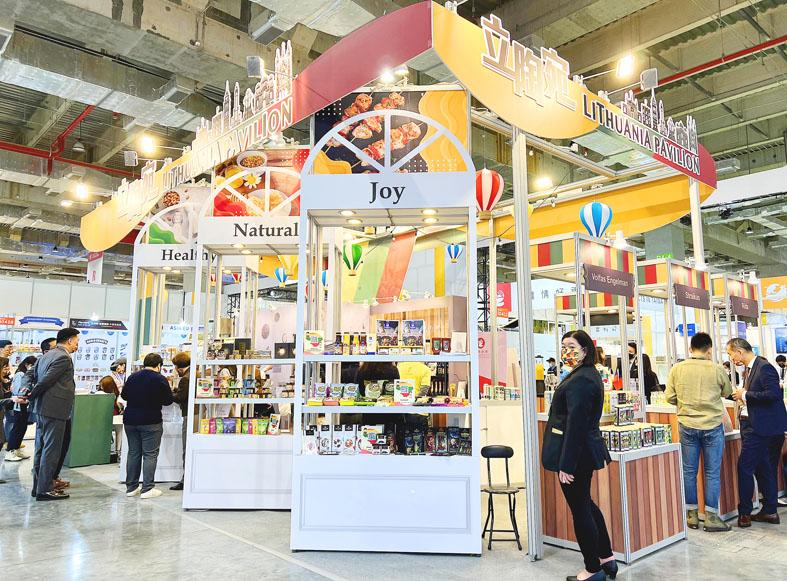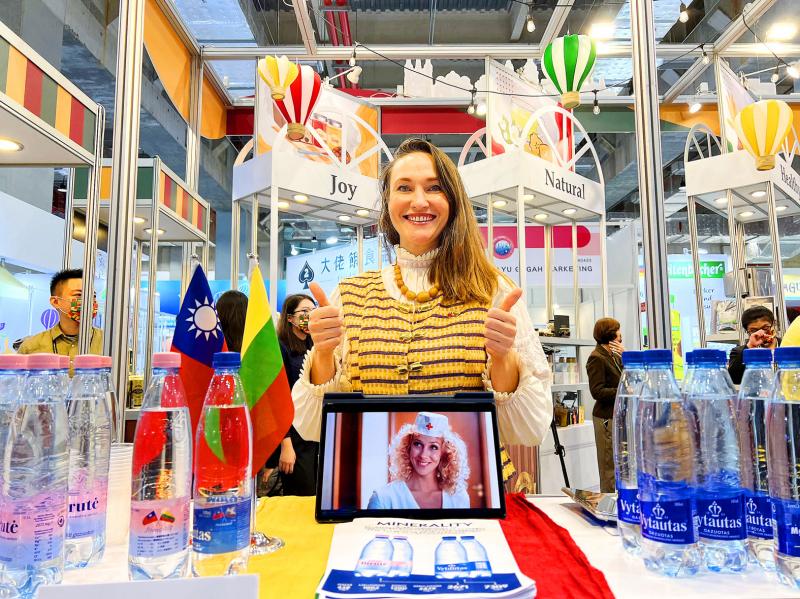The annual international food show Food Taipei opened yesterday, with the first-ever Lithuanian pavilion drawing a lot of attention.
The Lithuanian pavilion is one of 15 national pavilions featured at the show, and is participating for the first time because of the growing friendship and mutual support between the two countries, Taiwan External Trade Development Council (TAITRA, 外貿協會) chairman James Huang (黃志芳) said.
The pavilion, which features 25 companies, including importers and distributors of Lithuanian products, opened with a traditional dance performance and Huang presenting a large block of chocolate decorated with depictions of Taiwan and Lithuania, a heart and a Christmas tree.

Photo: CNA
“Lithuania is our new friend in Europe. It is a very friendly nation that supports Taiwan wholeheartedly and TAITRA reciprocated by inviting some of the Lithuanian pavilion participants,” Huang said.
Huang was referring to the Baltic state allowing Taiwan to open a representative office in Vilnius last month using the name “Taiwanese” as its official title. Taiwan’s representative offices in other European countries usually use “Taipei” in their official title.
Huang said he believed Taiwanese would be eager to buy Lithuanian products to show their gratitude to the country, adding that Lithuania can use the opportunity to introduce its products to Taiwan.

Photo: CNA
Two products featured at the Lithuanian pavilion are a special buckwheat grain that Lithuanians boil and eat with butter and a high mineral content spring water.
Ausra Andriuskaite, chairwoman of the Lithuanian community in Taiwan, said that even though there are only about 22 Lithuanian residents in Taiwan, she is still confident that Lithuania’s food products would find success in Taiwan, because consumers have similar preferences.
“Lithuanians and Taiwanese like to eat good quality and healthy food, and food from Lithuania is exactly like that,” said Andriuskaite, who is married to a Taiwanese and has lived in Taiwan for the past seven years.
“Taiwanese also like to try new things and they support Lithuania, so for sure they will want to taste the country’s food products,” she added.
Taiwan’s bilateral trade with Lithuania totaled US$155.692 million in the first 11 months of this year, with US$116.863 million in exports and US$38.829 million in imports, Bureau of Foreign Trade statistics showed.
Another national pavilion that drew a lot of attention was the Indonesian showcase, which features 10 companies offering food, snacks and sauces from global brand names, as well as small and medium-sized enterprises.
Trade analyst Muhammad Fuad Hamzah from the Indonesia Economic and Trade Office to Taipei said that Indonesian snacks are popular in Taiwan, many of which can be found at Southeast Asian grocery stores and big supermarket chains.
Taiwan imported US$44.802 million of Indonesian processed food from January to last month, an 11 percent increase from the same period last year, Fuad said.
Meanwhile, the Somaliland pavilion attracted scores of visitors eager to sample the country’s cooked food, such as a meat jerky known as muqmad and a confectionery called halwa.
Somaliland Representative to Taiwan Mohamed Hagi said it is the first time his office is taking part in the trade show, and their objective is to share the country’s culinary culture with Taiwanese before bringing a larger delegation of food manufacturers and distributors next year.
“Next year, we are planning to have a very big presence, and to invite our food companies and big restaurants to exhibit more about Somaliland’s culture to Taiwanese people,” he said.
Food Taipei, which runs until Saturday, is showcasing products from 28 countries and 478 businesses, spread out over 1,120 booths at Taipei Nangang Exhibition Center’s Hall 2.

Hon Hai Precision Industry Co (鴻海精密) yesterday said that its research institute has launched its first advanced artificial intelligence (AI) large language model (LLM) using traditional Chinese, with technology assistance from Nvidia Corp. Hon Hai, also known as Foxconn Technology Group (富士康科技集團), said the LLM, FoxBrain, is expected to improve its data analysis capabilities for smart manufacturing, and electric vehicle and smart city development. An LLM is a type of AI trained on vast amounts of text data and uses deep learning techniques, particularly neural networks, to process and generate language. They are essential for building and improving AI-powered servers. Nvidia provided assistance

DOMESTIC SUPPLY: The probe comes as Donald Trump has called for the repeal of the US$52.7 billion CHIPS and Science Act, which the US Congress passed in 2022 The Office of the US Trade Representative is to hold a hearing tomorrow into older Chinese-made “legacy” semiconductors that could heap more US tariffs on chips from China that power everyday goods from cars to washing machines to telecoms equipment. The probe, which began during former US president Joe Biden’s tenure in December last year, aims to protect US and other semiconductor producers from China’s massive state-driven buildup of domestic chip supply. A 50 percent US tariff on Chinese semiconductors began on Jan. 1. Legacy chips use older manufacturing processes introduced more than a decade ago and are often far simpler than

STILL HOPEFUL: Delayed payment of NT$5.35 billion from an Indian server client sent its earnings plunging last year, but the firm expects a gradual pickup ahead Asustek Computer Inc (華碩), the world’s No. 5 PC vendor, yesterday reported an 87 percent slump in net profit for last year, dragged by a massive overdue payment from an Indian cloud service provider. The Indian customer has delayed payment totaling NT$5.35 billion (US$162.7 million), Asustek chief financial officer Nick Wu (吳長榮) told an online earnings conference. Asustek shipped servers to India between April and June last year. The customer told Asustek that it is launching multiple fundraising projects and expected to repay the debt in the short term, Wu said. The Indian customer accounted for less than 10 percent to Asustek’s

Gasoline and diesel prices this week are to decrease NT$0.5 and NT$1 per liter respectively as international crude prices continued to fall last week, CPC Corp, Taiwan (CPC, 台灣中油) and Formosa Petrochemical Corp (台塑石化) said yesterday. Effective today, gasoline prices at CPC and Formosa stations are to decrease to NT$29.2, NT$30.7 and NT$32.7 per liter for 92, 95 and 98-octane unleaded gasoline respectively, while premium diesel is to cost NT$27.9 per liter at CPC stations and NT$27.7 at Formosa pumps, the companies said in separate statements. Global crude oil prices dropped last week after the eight OPEC+ members said they would